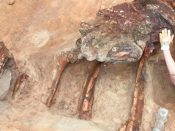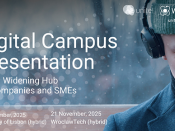Por Pedro Reis (Institute of Mechanical Engineering, École Polytechnique Fédérale de Lausanne - EPFL, Switzerland).
It used to be that academic seminars involved a researcher visiting a host institution to deliver a talk and meet with colleagues (do you remember those days?!). Times have changed, at least temporarily, but this situation is also opening opportunities. In this 'talk', we will be inviting you for a virtual tour of our Flexible Structures Laboratory (fleXLab) at EPFL in Switzerland. We will show you some of our experimental facilities and share some of our recent research activities, focusing on the mechanics of rods and knots. Multiple members of our team will be involved in this tour. Research at our fleXLab is centered in the general area of the mechanics of slender structures, leveraging their post-buckling regime for novel modes of functionality. Methodologically, we recognize scaled high-precision model experiments as a powerful tool for discovery in mechanics, supported by theory and computation, in a vision of science-enabled engineering and engineering-motivated science. For instance, we are trying to understand the intriguing mechanics of filaments in tight contact. In fabrics, ropes, or knots, the localized contact regions between filaments play an important role in setting the macroscopic mechanical response of the system. In our talk, we will first distill this class of systems down to what we see as the simplest building block by focusing on the mechanics of a single elastic filament wrapped in frictional contact around a rigid cylinder. Next, we will discuss our results on two filaments in tight contact, revealing a surprising inhomogenous pressure distribution between both filaments. Finally, we will present our compare-and-contrast investigation on the shapes of physical knots (using X-ray tomography) and idealized knots (based on purely geometric models), pointing to the central role of geometry in dictating the mechanics of this class of systems.
This virtual lab will also involve the participation of the following fleXLab members: Paul Grandgeorge (Postdoc), and Paul Johanns (Ph.D. student).
We are looking forward to 'e-hosting' you at our fleXLab at EPFL!
Short Bio: Pedro Miguel Reis, originally from Viseu, is a Professor of Mechanical Engineering at the École Polytechnique Fédérale de Lausanne (EPFL) in Switzerland, where he is the Director of the Institute of Mechanical Engineering. Prof. Reis received a B.Sc. in Physics from the University of Manchester, UK (1999), a Certificate of Advanced Studies in Mathematics (Part III Maths) from St. John’s College and DAMTP, University of Cambridge (2000) and a Ph.D. in physics from the University of Manchester (2004). He was a postdoc at the City College of New York (2004-2005) and at the CNRS/ESPCI in Paris (2005-2007). He joined MIT in 2007 as an Instructor in Applied Mathematics. In 2010 he moved to MIT’s School of Engineering, with dual appointments in Mechanical Engineering and Civil & Environmental Engineering, first as the Esther and Harold E. Edgerton Assistant Professor and, since the summer of 2014 as Gilbert W. Winslow Associate Professor. In October 2013, the Popular Science magazine named Prof. Reis to its 2013 “Brilliant 10” list of young stars in Science and Technology. He has also received the 2014 CAREER Award (NSF), the 2016 Thomas J.R. Hughes Young Investigator Award (Applied Mechanics Division of the ASME), the 2016 GSOFT Early Career Award for Soft Matter Research (APS), he is a Fellow of the APS, and he is the 2021 President of the Society of Engineering Science (SES).
Zoom:
Topic: CFTC weekly seminar
Time: Jun 24, 2021 10:00 AM Lisbon
Join from PC, Mac, Linux, iOS or Android
Or iPhone one-tap: 308804188,84836310950# or 308810988,84836310950#
Or Telephone:
Dial: +351 308 804 188 (Portugal Toll) or +351 308 810 988 (Portugal Toll)
Meeting ID: 848 3631 0950
International numbers available
Or a H.323/SIP room system:
H.323: 162.255.37.11 (US West) or 162.255.36.11 (US East)
Meeting ID: 848 3631 0950




















